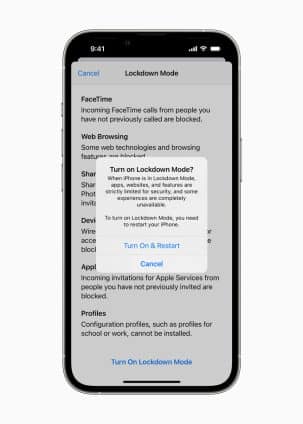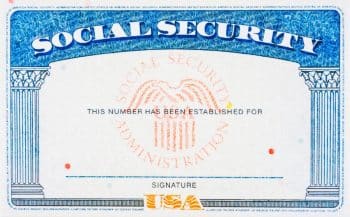Home » Business News • Spotlight • US business news » Apple’s new “lockdown mode” for iPhone fights hacking and spyware
Apple’s new “lockdown mode” for iPhone fights hacking and spyware
https://www.whatjobs.com/news/business-news/apples-new-lockdown-mode-for-iphone-fights-hacking-and-spyware

By Nagasunder in Business News, posted July 8, 2022

One of Apple's big selling products has always been the security of products like the iPhone, iPad, and Mac
The company has championed its products as the best around and has now introduced the next level of security.
On Wednesday, July 6, Apple strengthened that effort by announcing a new function called Lockdown Mode that will be available this fall.
This feature is made to counter target hacking attempts like the Pegasus malware, which oppressive governments allegedly used against human rights advocates, attorneys, politicians, and journalists.
Additionally, Apple announced a $10 million grant and a $2 million bug bounty to support additional studies into this emerging danger.
READ MORE: WOMAN CLAIMS APPLE AIRTAG WAS USED TO FOLLOW HER AROUND DISNEYLAND
Apple says Lockdown Mode is intended to activate "extreme" defenses on its phones, such as barring attachments and link previews in messages, potentially hackable web surfing technology, and incoming FaceTime calls from unknown numbers.
Apple devices will also not allow accessory connections unless the device is unlocked, and new remote management software cannot be installed on the devices while they are in Lockdown Mode.
The new capability is already available in developer test software this summer and will be made accessible to the public for free in the autumn as part of iOS 16, iPadOS 16, and macOS Ventura.
Ivan Krstić, Apple's head of security engineering and architecture said: "While the vast majority of users will never be the victims of highly targeted cyberattacks, we will work tirelessly to protect the small number of users who are,"
READ MORE: APPLE READY TO BARGAIN WITH ITS FIRST UNIONIZED STORE IN MARYLAND
"Lockdown Mode is a groundbreaking capability that reflects our unwavering commitment to protecting users from even the rarest, most sophisticated attacks."
Along with the new Lockdown Mode, which Apple describes as an "extreme" step, the corporation announced a $10 million gift to the Ford Foundation's Dignity and Justice Fund to protect human rights and resist social repression.
The company's attempts to improve device security come at a time when the technology industry is increasingly facing targeted assaults from authoritarian regimes all over the world.
Unlike broad ransomware or virus operations, which are generally aimed to spread indiscriminately through residential and business networks, Pegasus attacks are targeted for discreet intelligence collection.
Apple issued a free software update to address Pegasus in September and then sued NSO Group to prevent the business from creating or selling any further hacking tools.
It also started sending "Threat Notifications" to potential victims of these hacking tools, which Apple calls "mercenary spyware."
While the number of people targeted in these ads is tiny, the business says it has alerted people in around 150 countries since November.
According to Apple officials, the business aimed to strike a balance between convenience and exceptional security, and the company has publicly committed to enhancing and expanding its functionality.
Looking for a new job? Find the WhatJobs Career Advice Center here
Apple's applications will follow suit, albeit some websites can be preapproved to avoid Lockdown Mode if necessary. People who are in Lockdown Mode must also unlock their smartphone before it may connect to accessories.
Apple also stated that it believes a $10 million gift to the Dignity and Justice Fund would stimulate greater study on these topics as well as enhance training and security checks for persons who may be targeted.
Lori McGlinchey, director of the Ford Foundation's Technology and Society program, who is working with technical advisers including Apple's Krstić to help direct the fund said: “Every day we see these threats broadening and deepening.
"In recent years, state and non-state actors have used spyware to track and intimidate human rights defenders, environmental activists and political dissidents in virtually every region of the world."
Source: CNET
Follow us on YouTube, Twitter, LinkedIn, and Facebook














